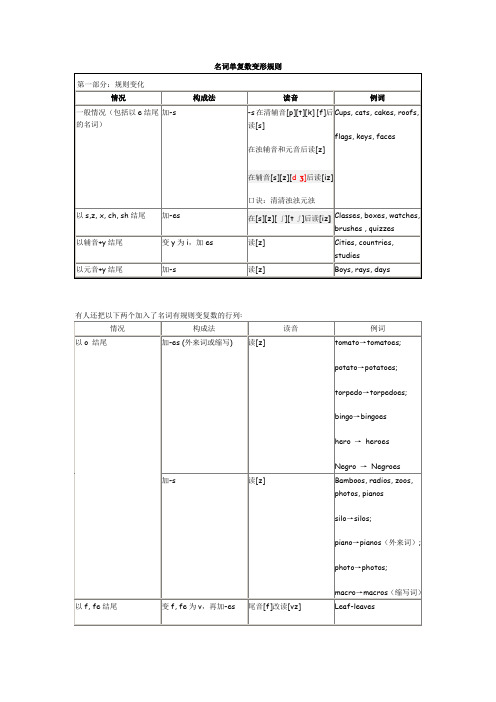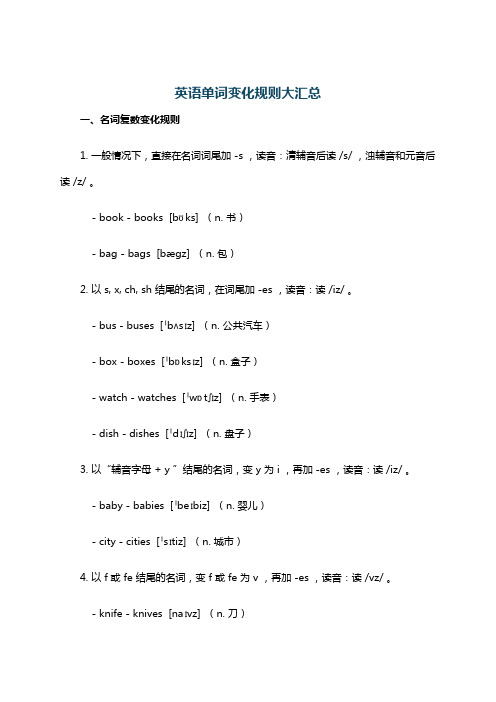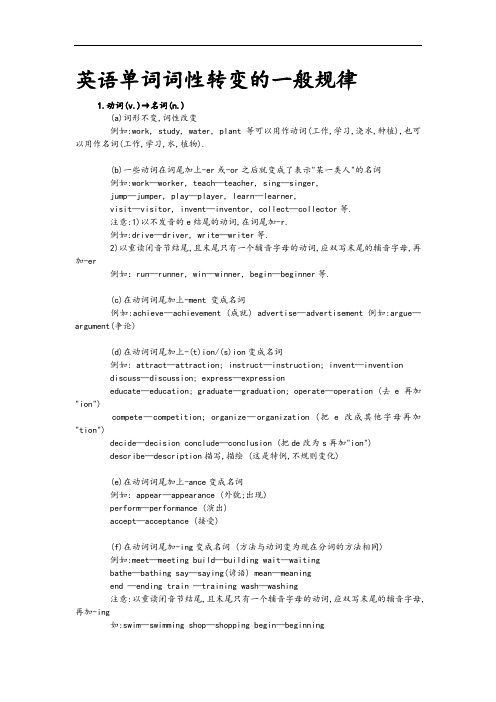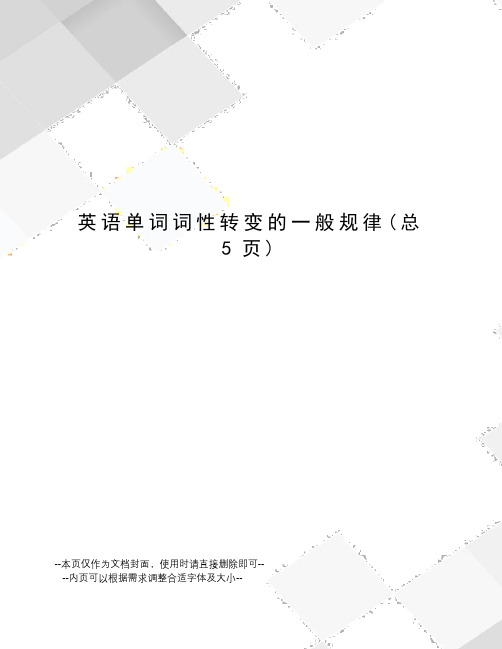英语单词变形规则汇总(ppt课件)
英语单词变形技巧

英语单词变形技巧一、名词复数变形。
1. 一般情况。
- 规则:在名词后直接加 -s。
- 示例:book[bʊk](n. 书)→books[bʊks];pen[pen](n. 笔)→pens[pens]。
2. 以s, x, ch, sh结尾的名词。
- 规则:加 -es,读[ɪz]。
- 示例:bus[bʌs](n. 公共汽车)→buses['bʌsɪz];box[bɒks](n. 盒子)→boxes['bɒksɪz];watch[wɒtʃ](n. 手表)→watches['wɒtʃɪz];dish[dɪʃ](n. 盘子)→dishes['dɪʃɪz]。
3. 以辅音字母 + y结尾的名词。
- 规则:把y变为i,再加 -es,读[z]。
- 示例:baby['beɪbɪ](n. 婴儿)→babies['beɪbɪz];city['sɪtɪ](n. 城市)→cities['sɪtɪz]。
4. 以f或fe结尾的名词。
- 规则:把f或fe变为v,再加 -es,读[vz]。
- 示例:leaf[li:f](n. 树叶)→leaves[li:vz];knife[naɪf](n. 小刀)→knives[naɪvz]。
但也有一些直接加 -s的情况,如roof[ru:f](n. 屋顶)→roofs[ru:fs]。
5. 不规则复数形式。
- 示例:man[mæn](n. 男人)→men[men];woman['wʊmən](n. 女人)→women['wɪmɪn];child[tʃaɪld](n. 儿童)→children['tʃɪldrən];foot[f ʊt](n. 脚)→feet[fi:t];tooth[tu:θ](n. 牙齿)→teeth[ti:θ];mouse[ma ʊs](n. 老鼠)→mice[maɪs]。
二、动词第三人称单数(v - s/v - es)变形。
名词单复数变形规则

名词单复数变形规则第二部分:不规则变化(10 minutes)我们经常会看到有些名词变复数时并没有遵循上述规则。
这就是名词的不规则变化。
还有一些名词,单复数是同一个形式的。
不过,我们还是可以通过一些比较,发现其中的一些奥妙。
以下我将为大家讲讲名词的不规则变化。
一、有些名词中保存了英语中古旧的复数形式,如:(口头介绍)man-men woman-womentooth-teeth foot-feetchild-children goose-geesemouse-mice ox-oxen二、有些是外来词,仍保有原来的复数形式,如:(黑体部分PPT展示)Phenomenon-phenomena(现象)Formula-formulae(公式)Thesis-theses(论文)Basis-bases(基础)Analysis-analyses(分析)Crisis-crises(危机)Appendix-appendices(附录)Datum-dataBacterium-bacteriaCriterion-criteria(标准)三、部分单词的复数形式不变。
例:fish→fish; sheep→sheep; cattle→cattle; deer→deer; salmon→salmon, means→means四、compound nouns,这类复数词是以主要的名词来表示(PPT展示)(以下5分钟)例:daughter-in-law→daughters-in-law 媳妇; father-in-law→fathers-in-law岳父man-of-war→men-of-war兵舰; maid-servant→maid-servantsstep-son→step-sons继子; son-in-law→sons-in-law; passer-by→passers-by.stand-by →stands-byman-of-war→men-of-war 战舰maid-servant→maid-servants女佣人但是,也有些合成名词,特别是由man和woman构成的合成名词,里面所含的成分,全都要变为复数,如:Man-servant-men-servants,woman doctor-women doctors,men cooks等两个组成部分皆变为复数:* 这种形式的第一个名词必须是man或woman五、有些名词经常是带着-s词尾的,但通常都作单数看待,如:(PPT展示)Phonetics(语音学),physics(物理学),optics(光学),politics(政治),news(新闻)等。
英语单词变化规则大汇总

英语单词变化规则大汇总一、名词复数变化规则1. 一般情况下,直接在名词词尾加 -s ,读音:清辅音后读 /s/ ,浊辅音和元音后读 /z/ 。
- book - books [bʊks] (n. 书)- bag - bags [bæɡz] (n. 包)2. 以 s, x, ch, sh 结尾的名词,在词尾加 -es ,读音:读 /iz/ 。
- bus - buses [ˈbʌsɪz] (n. 公共汽车)- box - boxes [ˈbɒksɪz] (n. 盒子)- watch - watches [ˈwɒtʃɪz] (n. 手表)- dish - dishes [ˈdɪʃɪz] (n. 盘子)3. 以“辅音字母 + y ”结尾的名词,变 y 为 i ,再加 -es ,读音:读 /iz/ 。
- baby - babies [ˈbeɪbiz] (n. 婴儿)- city - cities [ˈsɪtiz] (n. 城市)4. 以 f 或 fe 结尾的名词,变 f 或 fe 为 v ,再加 -es ,读音:读 /vz/ 。
- knife - knives [naɪvz] (n. 刀)- leaf - leaves [liːvz] (n. 树叶)5. 不规则变化- man - men [men] (n. 男人)- woman - women [ˈwɪmɪn] (n. 女人)- child - children [ˈtʃɪldrən] (n. 孩子)- foot - feet [fiːt] (n. 脚)- tooth - teeth [tiːθ] (n. 牙齿)- mouse - mice [maɪs] (n. 老鼠)二、动词第三人称单数变化规则1. 一般情况下,直接在动词词尾加 -s ,读音:清辅音后读 /s/ ,浊辅音和元音后读 /z/ 。
- work - works [wɜːks] (v. 工作)- play - plays [pleɪz] (v. 玩)2. 以 s, x, ch, sh 结尾的动词,在词尾加 -es ,读音:读 /iz/ 。
英语单词变形规则大全

英语单词变形规则大全一、名词复数变形规则。
1. 一般情况。
- 规则:在名词后加 -s。
- 例词:book[bʊk] - books[bʊks];pen[pen] - pens[pens]。
- 词性:名词(n.)2. 以s, x, ch, sh结尾的名词。
- 规则:加 -es。
- 例词:bus[bʌs] - buses[ˈbʌsɪz];box[bɒks] - boxes[ˈbɒksɪz];watch[wɒtʃ] - watches[ˈwɒtʃɪz];dish[dɪʃ] - dishes[ˈdɪʃɪz]。
- 词性:名词(n.)3. 以辅音字母 + y结尾的名词。
- 规则:把y变为i,再加 -es。
- 例词:city[ˈsɪti] - cities[ˈsɪtiz];baby[ˈbeɪbi] - babies[ˈbe ɪbɪz]。
- 词性:名词(n.)4. 以f或fe结尾的名词。
- 规则:把f或fe变为v,再加 -es。
- 例词:knife[naɪf] - knives[naɪvz];leaf[li:f] - leaves[li:vz]。
- 部分特例:roof[ru:f] - roofs[ru:fs](直接加 -s)。
5. 以o结尾的名词。
- 规则:- 有生命的加 -es,如:potato[pəˈteɪtəʊ] - potatoes[pəˈteɪtəʊz];tomato[təˈmɑ:təʊ] - tomatoes[təˈmɑ:təʊz]。
- 无生命的加 -s,如:photo[ˈfəʊtəʊ] - photos[ˈfəʊtəʊz];piano[piˈænəʊ] - pianos[piˈænəʊz]。
- 词性:名词(n.)二、动词第三人称单数变形规则(与名词复数变形规则有相似之处)1. 一般情况。
- 规则:在动词后加 -s。
- 例词:like[laɪk] - likes[laɪks];play[pleɪ] - plays[pleɪz]。
英语单词词性转变的一般规律

英语单词词性转变的一般规律1.动词(v.)→名词(n.)(a)词形不变,词性改变例如:work, study, water, plant等可以用作动词(工作,学习,浇水,种植),也可以用作名词(工作,学习,水,植物).(b)一些动词在词尾加上-er或-or之后就变成了表示"某一类人"的名词例如:work—worker, teach—teacher, sing—singer,jump—jumper, play—player, learn—learner,visit—visitor, invent—inventor, collect—collector等.注意:1)以不发音的e结尾的动词,在词尾加-r.例如:drive—driver, write—writer等.2)以重读闭音节结尾,且末尾只有一个辅音字母的动词,应双写末尾的辅音字母,再加-er例如:run—runner, win—winner, begin—beginner等.(c)在动词词尾加上-ment 变成名词例如:achieve—achievement (成就) advertise—advertisement例如:argue—argument(争论)(d)在动词词尾加上-(t)ion/(s)ion变成名词例如: attract—attraction; instruct—instruction; invent—inventiondiscuss—discussion; express—expressioneducate—education; graduate—graduation; operate—operation (去e再加"ion")compete—competition; organize—organization (把e改成其他字母再加"tion")decide—decision conclude—conclusion (把de改为s再加"ion")describe—description描写,描绘 (这是特例,不规则变化)(e)在动词词尾加上-ance变成名词例如: appear—appearance (外貌;出现)perform—performance (演出)accept—acceptance (接受)(f)在动词词尾加-ing变成名词 (方法与动词变为现在分词的方法相同)例如:meet—meeting build—building wait—waitingbathe—bathing say—saying(谚语) mean—meaningend —ending train —training wash—washing注意:以重读闭音节结尾,且末尾只有一个辅音字母的动词,应双写末尾的辅音字母,再加-ing如:swim—swimming shop—shopping begin—beginning(g)其他一些比较特殊的变化例如: Beg(乞讨)—beggar(乞丐) behave(行为举止)—behaviorknow(知道)—knowledge(知识) fly—flight (飞行)heat (加热)—heat(热量) hit (撞击)—hit( 轰动一时的人或物,碰撞)mix (混合)—mixture(混合物) press(按,压)—pressure(压力)sit(坐)—seat (座位) succeed—success(成功)tour—tour(旅游)/ tourist (游客)2.动词(v.)→形容词(adj.)(a)动词后面加able,以e结尾的动词则去e加able,表示具有此性质,特点或属性.例如: afford-affordable;love-lovable(b)动词后面加ed,以e结尾的动词则直接加d,表示被动性的属性或特点.例如: scatter-scattereduse-used(c)不规则的动词则必须记忆,记住其过去分词形式.规律不大,意义同(b).3.名词(n.)→形容词(adj.)(a)在名词后面加-y可以变成形容词(尤其是一些与天气有关的名词)例如: rain—rainy, cloud—cloudy, wind—windy, snow—snowy,health—healthy, luck—lucky, anger—angry guilt—guilty(内疚的)tourist—touristy(游客多的) , salt (盐)—salty (咸的)silk(丝绸)—silky(丝绸般的), sleep—sleepy (昏昏欲睡的)注意:1)如果以重读闭音节结尾,且词尾只有一个辅音字母,这时应双写辅音字母再加"-y".如: sun—sunny, fun—funny, fog—foggy(有雾的), fur—furry(毛皮的)2)少数以不发音的e结尾的名词变为形容词时,应去掉e再加"-y".如: noise—noisy, ice—icy, shine—shiny(发亮的), taste(口味)—tasty(甜的)(b)名词后面加-ed,以e结尾的直接加d.例如: spot(斑点)—spotted(有斑点的); talent—talented (有天赋的)organize—organized 有组织的; balance—balanced(平衡的)(c)一些抽象名词在词尾加-ful可以变为形容词例如:care—careful, thank—thankful, help—helpful,use—useful, meaning—meaningful(d)在名词后加-less构成含有否定意义的形容词例如:care—careless(粗心的), use—useless(无用的)hope—hopeless(没希望的),home—homeless(无家可归的)(e)一些以-ce结尾的名词,把-ce改为-t变成形容词例如: difference—different, silence—silent, confidence—confident(f).在名词后加-ly变为形容词例如: friend—friendly, love—lovely, live---lively(g).在名词后加-ous变为形容词例如: danger—dangerous(h)名词后面加-al变为形容词例如: music—musical; medicine—medical (这个比较特殊)(i)名词后面加-able变为形容词,如果以e结尾就去e再加"-able".例如: adjust—adjustable 可调整的value—valuable有价值的(j)名词后面加-en变成形容词例如: wood—wooden 木制的wool—woolen 羊毛的(k)一些表示国家的名词可以在词尾加-ese, -ish或-n构成表示国籍,语言的形容词例如:China—Chinese, Japan—Japanese, England—English,America—American, India—Indian, Australia —Australian(注意Canada—Canadian)4..形容词(adj.)→副词(adv.)▲一般在形容词的词尾加-ly可以变成副词例如: quick—quickly, slow—slowly, loud—loudly, sudden—suddenly 等但是,以下几点值得注意:(a) 一些以"辅音字母+y"结尾的形容词,要把y改为i再加-ly例如: happy—happily, angry—angrily, lucky—luckily, heavy—heavily, noisy—noisily(b) 有些以-ble或-le结尾的形容词,去掉e加-y例如:possible—possibly, terrible—terribly(c)少数以e结尾的形容词,要去掉e再加-ly例如: true—truly但绝大多数以e结尾的形容词仍然直接加-ly 例如: polite—politely, wide—widely(d)以-l结尾的形容词变为副词时要在词尾加-ly,以--ll结尾的才在词尾只加-y.例如: usual—usually, careful—carefully, useful—usefullyfull—fully (以-ll结尾的才只加y)英语词汇后缀系列(一)——形容词后缀able以“-able”结尾的形容词一般有两种情况:(1)v.+able→adj. 以这种方式构成的形容词其意义为“能……的”、“可以(被)……的”、“适合于……的”、“值得……的”等,即有被动含义。
英语单词词性转变的一般规律

英语单词词性转变的一般规律(总5页)--本页仅作为文档封面,使用时请直接删除即可----内页可以根据需求调整合适字体及大小--英语单词词性转变的一般规律1.动词(v.)→名词(n.)(a)词形不变,词性改变例如:work, study, water, plant等可以用作动词(工作,学习,浇水,种植),也可以用作名词(工作,学习,水,植物).(b)一些动词在词尾加上-er或-or之后就变成了表示"某一类人"的名词例如:work—worker, teach—teacher, sing—singer,jump—jumper, play—player, learn—learner,visit—visitor, invent—inventor, collect—collector等.注意:1)以不发音的e结尾的动词,在词尾加-r.例如:drive—driver, write—writer等.2)以重读闭音节结尾,且末尾只有一个辅音字母的动词,应双写末尾的辅音字母,再加-er例如:run—runner, win—winner, begin—beginner等.(c)在动词词尾加上-ment 变成名词例如:achieve—achievement (成就) advertise—advertisement例如:argue—argument(争论)(d)在动词词尾加上-(t)ion/(s)ion变成名词例如: attract—attraction; instruct—instruction; invent—inventiondiscuss—discussion; express—expressioneducate—education; graduate—graduation; operate—operation (去e再加"ion")compete—competition; organize—organization (把e改成其他字母再加"tion")decide—decision conclude—conclusion (把de改为s再加"ion")describe—description描写,描绘 (这是特例,不规则变化)(e)在动词词尾加上-ance变成名词例如: appear—appearance (外貌;出现)perform—performance (演出)accept—acceptance (接受)(f)在动词词尾加-ing变成名词 (方法与动词变为现在分词的方法相同)例如:meet—meeting build—building wait—waitingbathe—bathing say—saying(谚语) mean—meaningend —ending train —training wash—washing注意:以重读闭音节结尾,且末尾只有一个辅音字母的动词,应双写末尾的辅音字母,再加-ing如:swim—swimming shop—shopping begin—beginning(g)其他一些比较特殊的变化例如: Beg(乞讨)—beggar(乞丐) behave(行为举止)—behaviorknow(知道)—knowledge(知识) fly—flight (飞行)heat (加热)—heat(热量) hit (撞击)—hit( 轰动一时的人或物,碰撞)mix (混合)—mixture(混合物) press(按,压)—pressure(压力)sit(坐)—seat (座位) succeed—success(成功)tour—tour(旅游)/ tourist (游客)2.动词(v.)→形容词(adj.)(a)动词后面加able,以e结尾的动词则去e加able,表示具有此性质,特点或属性.例如: afford-affordable;love-lovable(b)动词后面加ed,以e结尾的动词则直接加d,表示被动性的属性或特点.例如: scatter-scattereduse-used(c)不规则的动词则必须记忆,记住其过去分词形式.规律不大,意义同(b).3.名词(n.)→形容词(adj.)(a)在名词后面加-y可以变成形容词(尤其是一些与天气有关的名词)例如: rain—rainy, cloud—cloudy, wind—windy, snow—snowy,health—healthy, luck—lucky, anger—angry guilt—guilty(内疚的) tourist—touristy(游客多的) , salt (盐)—salty (咸的)silk(丝绸)—silky(丝绸般的), sleep—sleepy (昏昏欲睡的)注意:1)如果以重读闭音节结尾,且词尾只有一个辅音字母,这时应双写辅音字母再加"-y".如: sun—sunny, fun—funny, fog—foggy(有雾的), fur—furry(毛皮的)2)少数以不发音的e结尾的名词变为形容词时,应去掉e再加"-y".如: noise—noisy, ice—icy, shine—shiny(发亮的), taste(口味)—tasty(甜的)(b)名词后面加-ed,以e结尾的直接加d.例如: spot(斑点)—spotted(有斑点的); talent—talented (有天赋的) organize—organized 有组织的; balance—balanced(平衡的)(c)一些抽象名词在词尾加-ful可以变为形容词例如:care—careful, thank—thankful, help—helpful,use—useful, meaning—meaningful(d)在名词后加-less构成含有否定意义的形容词例如:care—careless(粗心的), use—useless(无用的)hope—hopeless(没希望的),home—homeless(无家可归的)(e)一些以-ce结尾的名词,把-ce改为-t变成形容词例如: difference—different, silence—silent, confidence—confident(f).在名词后加-ly变为形容词例如: friend—friendly, love—lovely, live---lively(g).在名词后加-ous变为形容词例如: danger—dangerous(h)名词后面加-al变为形容词例如: music—musical; medicine—medical (这个比较特殊)(i)名词后面加-able变为形容词,如果以e结尾就去e再加"-able".例如: adjust—adjustable 可调整的value—valuable有价值的(j)名词后面加-en变成形容词例如: wood—wooden 木制的wool—woolen 羊毛的(k)一些表示国家的名词可以在词尾加-ese, -ish或-n构成表示国籍,语言的形容词例如:China—Chinese, Japan—Japanese, England—English,America—American, India—Indian, Australia —Australian(注意Canada—Canadian)4..形容词(adj.)→副词(adv.)▲一般在形容词的词尾加-ly可以变成副词例如: quick—quickly, slow—slowly, loud—loudly, sudden—suddenly 等但是,以下几点值得注意:(a) 一些以"辅音字母+y"结尾的形容词,要把y改为i再加-ly例如: happy—happily, angry—angrily, lucky—luckily, heavy—heavily, noisy—noisily(b) 有些以-ble或-le结尾的形容词,去掉e加-y例如:possible—possibly, terrible—terribly(c)少数以e结尾的形容词,要去掉e再加-ly例如: true—truly但绝大多数以e结尾的形容词仍然直接加-ly 例如: polite—politely, wide —widely(d)以-l结尾的形容词变为副词时要在词尾加-ly,以--ll结尾的才在词尾只加-y.例如: usual—usually, careful—carefully, useful—usefullyfull—fully (以-ll结尾的才只加y)英语词汇后缀系列(一)——形容词后缀able以“-able”结尾的形容词一般有两种情况:(1)v.+able→adj. 以这种方式构成的形容词其意义为“能……的”、“可以(被)……的”、“适合于……的”、“值得……的”等,即有被动含义。
初中英语动词-动词的第三人称单数形式课件(共18张PPT)
概念 特征 变形 规律
概念
1.My teacher sp_e_a_ks (speak) 特征 Chinese well.
2.She lo_v_e_s (love)reading变.形 3.Ted h_a_s_ (have) a brother. 4. I _a_m_(is, am, are) a stude规nt律.
play
规律
5. They can speak English概 念.
否定:can
can not
特征
6.It love eating meat. (love变)形
否定:loves
doesn’t love 规律
7. This is an apple.
概念
否定: is is not
8. Grace’s father spends 特 征
5.You s_tu_d_y (study) English w概 e念ll. 6.We _lik_e_(like) singing.
7.John sp_e_n_ds (spend) a lot o特f征
time with TV.
8.
My
brotherwa_t_c_hes(watch变)
形
TV
every night.
变形
如上所示,当主语为第三人称单数时,动词要 做相应的变化,这就是动词的“三单”形式。 动词第三人称单数一般以-s, -es, -ies结尾。
规律
动词“三单”的变化
get
make
read
live
walk
eat
概念 特征
gets makes
reads lives
walks
英语单词变化规则大汇总
英语单词变化规则大汇总(总11页) -本页仅作为预览文档封面,使用时请删除本页-英语单词的各种变化规则一、名词复数变化:(二)名词复数的不规则变化:1.child→children(儿童)man→men(男人)woman→women (女人)an Englishman→two Englishmen(英国人)foot→feet(脚)tooth→teeth (牙)mouse→mice(老鼠)ox →oxen(公牛)goose→geese(鹅)2.单复同形deer,sheep,fish,Chinese,Japanese,Swiss, species,means除人民币,美元、英镑、法郎等都有复数形式。
如:a dollar,two dollars; a meter,two meters3.集体名词,以单数形式出现,但实为复数。
people police cattle是复数(Correctness:a person,a policeman,a head of cattle,the English,the British,the French,the Chinese,the Japanese,the Swiss )(Error:a people,a police,a cattle )表示国民总称时,作复数用。
(The Chinese are industrious and brave. 中国人民是勤劳勇敢的。
)4.以s结尾,仍为单数的名词1)maths,politics,physics等学科名词,为不可数名词,是单数。
2)news是不可数名词。
5. 表示由两部分构成的东西,glasses(眼镜) trousers (长裤) clothes(衣服)若表达具体数目,要借助数量词pair(对,双)a pair of glasses ,two pairs of trousers\suit(套)6.另外还有一些名词,其复数形式有时可表示特别意思goods (货物) waters (水域) fishes (各种鱼)练习:写出下列各词的复数I _________ him _________ this ___________ her ______watch _______ child _______ photo ________ diary ______day________ foot________ book_______ dress ________tooth_______ sheep ______ box________ strawberry _____thief _______ fish______ peach______ sandwich ______man______ woman_______ paper_______ juice___________water________ milk________ rice__________ tea__________二、序数词变化规则(一)一般化规则:基数词+th→序数词(规则变化)four(四)→fourth(第四)six(六)→sixth(第六)seven(七)→seventh(第七)ten(十)→tenth(第十)eleven(十一)eleventh→(第十一)(二)**不规则变化的one(一)→first(第一) twenty-one → twenty-firsttwo(二)→second(第二)three(三)→third(第三)five(五)→fifth(第五)eight(八)→eighth(第八) fifty-eight → fifty-eighth nine(九)→ninth(第九)twelve(十二)→twelfth(第十二)(三)从13—19的基数词,都在个位数后加teen构成14→fourteen15→fifteen16→sixteen17→seventeen18→eighteen19→nineteen(四)整十的序数词,变y为ie再加th20 twenty→twentieth第二十30 thirty→thirtieth第三十40 forty→fortieth第十四50 fifty→fiftieth第五十60 sixty→sixtieth第六十70 seventy→seventieth第七十80 eight→eightieth第八十90 ninety→ninetieth第九十(五)分数的表达:分子用:基数词分母用:序数词特别要注意:当分子大于1时,分母要用:复数1/2 one second ; a half ; 1/4 a quarter ;3/4 three quarters 7/8 seven eighths3/5 three fifths(六)加减乘除表达a decimal number 小数a fraction 分数a percentage 百分数a odd number奇数an even number 偶数degrees 度数1) 加:and; plus; add to2+4=6Two and four is/equals six.或Two plus four is/equals six.或Two added to four equals six.2)减:minus ; subtract from 8-3=5Eight minus three is/equals five.或Three subtracted from eight is five.3)乘:multiply...by;multiplied by /times 3×5=15Multiply three by five is/equals fifteen.或Three multiplied by five is/equals fifteen.4)除:divide by.../divide ...by... 24÷8=3Twenty-four divided by eight is/equals three.或Divide 24 by 8 is /equals three.三.形容词比较级和最高级的变化规则:1.一般在词尾加er/est;2.以字母e 结尾,加r/st ;3.以一个元音字母和一个辅音字母结尾,应双写末尾的辅音字母,再加er/st ;原级比较级最高级slim slimmer slimmestbig bigger biggesthot hotter hottestfat fatter fattestthin thinner thinnestwet wetter wettestred redder reddestsad sadder saddest4.以“辅音字母+y”结尾,先把y变i,再加er/st5.多音节词.和部分双音节词,在单词前面加more或mostimportant more important most importantdifficult more difficult most difficultinteresting more interesting most interestinguseful more useful most usefulbeautiful more beautiful most beautiful6.不规则形容词比较级:原级比较级最高级good/well better bestbad/ill worse worstmany/much more mostlittle less leastold older/elder oldest/eldestred redder reddestfar further/farther furthest /farthest写出下列形容词的比较级和最高级old__________ young________ tall_______ long________short________ strong________ big________ small_______fat_________ thin__________ heavy______ light________nice________ good_________ beautiful____________________high_________ slow_______ fast________ low______late__________ early_________ far_________ well_______四.动词第三人称单数变化规则1.一般情况下,直接加-s,如:cook-cooks, milk-milks2.以s. x. sh. ch. o结尾,加-es,如:guess-guesses, wash-washes, watch-watches, go-goes3.以“辅音字母+y”结尾,变y为i, 再加-es,如:study-studies写出下列动词的第三人称单数drink ________ go _________ stay ________ make ________look _________ have_______ pass_______ carry ________come________ watch______ plant_______ fly __________study_______ brush________ do_________ teach________五.动词现在分词加ing的变化规则1.一般情况下,直接加ing,如:cook-cooking2.以不发音的e结尾,去e加ing,如:make-making, taste-tasting3. 以ie结尾的动词,把ie变为y再加ing。
英文单词音变规律(超详细)
英语音变规律总结一、元音音变解码1.单个元音字母(a,e,i,o,u)可以互换例词:lip--- lap舔lip这个单词可能女孩子们更熟悉,在化妆品上常看到,是“嘴唇”的意思,但lap是什么意思呢我想大家已经猜到了,一定和嘴有关,原来他是“舔”的意思。
有的朋友可能会问,那为什么不是舌头的意思呢大家要注意,我们是记单词,而不是创造单词,它产生时赋予了什么意思,我们就记什么意思。
2.元音字母与元音字母组合的互换例词:free---friendfree是“自由”的意思,元音字母组合ee变成i,在加上一个名词后缀,就变成了friend,表示“朋友”。
那么free和friend有什么关系呢free和fri都表示“自由”的意思,friend表示的意思是可以自由沟通交流的人,这不就是朋友吗3.元音字母组合与元音字母组合的互换例词:week --- weakweek是“星期”的意思,元音字母组合ea换成ea就变成了表示“虚弱的”weak。
为什这两个单词会有关系呢原来它们都表示“弯转”的意思,第一个week表示过完一周从头开始,而第二个weak表示“易弯”,所以是“虚弱的”意思。
4.元辅字母组合的互换例词:flower---flour这两个单词也是同音词,元辅字母组合ower和our发生了互换。
那么表示“面粉”的flour 和表示“鲜花”的flower是什么关系呢花表示最美的,也就是最好的。
而面粉是粮食经过加工后剩下的精华,同样也是最好的,所以这两个词是近亲关系。
元音音变中,以单个元音字母之间以及单个元音字母和元音字母组合之间的音变最为常见。
二、辅音音变解码记忆口诀:辅音结成对,清浊是同类每次我去另一个教学区上课的时候,在公共汽车上总能看到一家医院的广告,广告词是“细心ke护女性健康” ,这里的“h e护”就被错读为“ke护”。
这说明我们汉语当中不只是有元音音变,同样也存在辅音音变。
只是我们不叫做辅音,而是叫做声母。
初中的英语单词变形
(根据字母排列顺序分类)1. able adj. 能够;有能力的ability n. 能力;才能2. act n. 扮演,表演active adj. 积极的,主动的activity n. 活动actor n. 男演员actress n. 女演员3. add v. 加上addition n. 加,增加4. age n. 时代,年龄aged adj. 有…之年岁的5. alive adj. 活着的live v. 生活,居住6. America n. 美国,美洲American adj. 美国的;美洲的n. 美国人7. amazing adj. 令人惊讶的amazed adj. 感到惊讶的8. amusement n. 娱乐,消遣amusing adj. 引起乐趣的,娱人的9. angry adj. 生气的;愤怒的angrily adv. 生气地;愤怒地10.apologize v. 道歉apology n. 道歉11. appear v. 出现disappear v. 消失12. argue v. 争论argument n. 争论13. art n. 艺术article n. 文章artist n. 艺术家,画家14. automatic adj. 自动的automatically adv. 自动地15. attract v. 吸引attraction n. 吸引;吸引力/物attractive adj. 有吸引力的16. Australia n. 澳大利亚Australian adj. 澳大利亚的n. 澳大利亚人17. beautiful adj. 美丽的beautifully adv. 美丽地18. begin (began, begun) v. 开始,着手beginning n. 开始,开端19. black n. 黑色adj. 黑色的blackboard n. 黑板20. Britain n. 不列颠British n. 英国人adj. 英国的21. bright adj. 明亮的,聪明的brightly adv. 明亮地22. build ( built, built ) v. 建造building n. 建筑物,大楼rebuild v. 重建23. business n. 商业,生意businessman n. 商人businesswoman n. 女商人24. Canada n. 加拿大Canadian adj. 加拿大的n. 加拿大人25. certain adj. 一定的,有把握的certainly adv. 一定,无疑,是的,当然26. care v. / n. 小心,关心,照顾careful adj. 小心的,仔细的carefully adv. 小心地,仔细地27. change v. 改变,兑零钱changeable adj. 易变的,可变的exchange v. 交流;交换28. chemical adj. 化学的chemistry n. 化学29. China n. 中国Chinese n. 中国人;汉语adj. 中国的30. choice n. 选择choose (chose, chosen) v. 选择31. city n. 城市citizen n. 市民32. class n. 班级,(一节)课,等级classroom n. 教室classmate n. 同学33. clear adj. 清晰的,明亮的clearly adv. 清晰道,明亮地34. cloud n. 云cloudy adj. 多云的,阴天的35. collect v. 收集,采集collection n. 收集36. custom n. 习惯,风俗customer n. 顾客customs n. 海关37. cycle v. 骑车cyclist n. 骑自行车的人38. daily n. 日报day n. 天,白天daytime n. 白天39. danger n. 危险dangerous adj. 危险的40. dead adj. 死的,无生命的die v. 死death n. 死亡dying a. 垂死的41 decide v. 决定,下定决心decision n. 决心development n. 发展43 difference n. 区别different adj. 不同的,差异的44 difficult adj. 困难的,艰难的difficulty n. 困难45 discuss v. 讨论discussion n. 讨论46 dishonest adj. 不老实honest adj. 诚实的honesty n. 诚实47 dislike v. 不喜欢like v. 喜欢48 drive (drove, driven) v. 驾驶,驱赶driver n. 驾驶员,司机49 easily adv. 容易地easy adj. 容易的50 education n. 教育educational adj. 教育的51 effect n. n. 效果efficient adj. 效率高的;有能力的52 electric adj. 电的electronic adj. 电子的electricity n. 电53 engine n. 发动机engineer n. 工程师54 England n. 英格兰English n. 英国;英国人;英语adj. 英国的;英语的55 enjoy v. 欣赏,享有,喜欢enjoyable adj. 愉快的,欢乐的joy n. 欢乐,高兴56 enter v. 进入,参加entrance n. 进入57 excited adj. 兴奋的exciting adj. 令人兴奋的58 expense n. 花费,费用expensive adj. 昂贵的59 fair adj. 公平的,合理的unfair adj. 不公平的60 say (said, said) v. 说,讲saying n. 谚语,格言61 farm n. 农场,农庄farmer n. 农民,农夫62 favour n. 恩惠favourite adj. 最喜欢的63 female n. 女性;雌性male n. 男性;雄性64 final adj. 最后的,最终的finally adv. 最后,最终65 fire n. 活,火炉,火灾fireman n. 消防队员firework n. 烟火66 fish n. 鱼,鱼肉v. 捕鱼fisherman n. 渔夫flight n. 飞行,航班68 follow v. 听从following adj. 下列的69 fool v. 愚弄,欺骗foolish adj. 愚蠢的70 foot (pl. feet) n. 脚,足;英尺football n. 足球71 foreign n. 外国的foreigner adj. 外国人72 forget (forgot, forgot/forgotten) v. 忘记forgetful adj. 健忘的unforgettable adj. 难忘的73 free adj. 自由的,空闲的,免费的freedom n. 自由74 freeze (froze, frozen) v. 结冰freezing adj. 极冷的frozen adj. 冰冻的75 friend n. 朋友friendly adj. 友好的,朋友般的friendship n. 友谊76 frighten v. 使害怕frightened adj. 受惊吓的frightening adj. 令人害怕的77 fun n. 乐趣,有趣,玩笑funny adj. 滑稽的, 可笑的78 gentle adj. 温柔的gently adv. 温柔地gentleman n. 绅士;先生79 German n. 德国人;德语adj. 德国的Germany n. 德国80 gold n. 黄金golden adj. 金色的81 happy adj. 幸福的;快乐的happily adv. 幸福地;快乐地82 harm n. 有害harmful adj. 有害的harmless adj. 无害的83 headmaster n. 校长headmistress n. 女校长84 heat n. 热度,热量v. 加热hot adj. 热的heater n. 取暖器85 health n. 健康healthy adj. 健康的unhealthy adv. 不健康的86 heavily adv. 沉重地,大量地heavy adj. 重的87 height n. 高度high adj. 高的88 help n. / v. 帮助helpful adj. 有帮助的, 有益的89 historical adj. 历史的,历史上history n. 历史90 home n. 家adv. 在家homeless adj. 无家可归的91 hungrily adv. 饥饿地hungry adj. 饥饿的92 hurry v.& n. 赶紧,急忙hurried adj. 赶紧的,急忙的hurriedly adv. 赶紧,急忙93 ice n. 冰ice cream n. 冰激淋94 ill adj. 有病的;不健康的illness n. 病,疾病95 importance n. 重要性important adj. 重要的96 impossible adj. 不可能的possibly adv. 可能地97 improve v. 改善,改进prove v. 证明98 interest n. 兴趣, 趣味interested adj. 感兴趣的interesting adj. 有趣的99 invent v. 发明,创造invention n. 发明,创造inventor n. 发明家100 invitation n. 邀请invite v. 邀请101 Italy n. 意大利Italian n. 意大利人;意大利语adj. 意大利的;意大利语地102 Japan n. 日本Japanese n. 日本人;日语adj. 日本的103 kind adj. 友好n. 种,类kindness n. 仁慈,好意104 know (knew, known) v. 知道, 认识knowledge n. 知识105 law n. 法律lawyer n. 律师106 length n. 长度long adj. 长的107 librarian n. 图书管理员library n. 图书室108 listen v. 听,倾听listener n. 听者,收听者109 locate v. 确定…的地方,把…设置在location n. 位子,场所110 loud adj. 响亮,的,大声的111 love n. 爱,喜欢v. 爱,喜欢lovely adj. 可爱,好看的,美好的112 luck n. 辛运luckily adv. 辛运地,侥幸地lucky adj. 辛运的,吉祥的unlucky adj. 不吉祥的unluckily adv. 不辛地113 main adj. 主要的mainly adv. 主要地114 manage v. 管理,处理,经营manager n. 经理115 medical adj. 医学的,医疗的medicine n. 药116 meet (met, met) v. 碰见,迎接,满足meeting n. 会,集会117 memorize v. 记住memory n. 记忆118 mix v. 混合mixture n. 混合物119 motor n. 马达motorcycle n. 摩托车120 nation n. 民族national adj. 民族的,国家的nationality n. 国籍native adj. 本土的,本国的n. 本地人,本国人121 nature n. 大自然natural adj. 大自然的,自然的122 near prep. 在……附近;靠近adj. 近的;附近的nearby adj.& adv. 附近的nearly adv. 几乎;差不多123 need v. 必须,需要necessary adj. 必要的,必须的unnecessary adj. 不必要的124 neighbour n. 邻居neighbourhood n. 邻接,邻近125 noise n. 声音,噪音noisy adj. 嘈杂的,喧闹的126 mouse n. 老鼠mice n. 老鼠127 once n. 一次one n. 一first num. 第一128 operate v. 施行手术,开刀operation n. 手术129 organization n. 组织,团体,机构organize v. 组织130 office n. 办公室officer n. 官员;办事员official adj. 官方的,官员的n. 官员131 own adj. 自己的v. 拥有n. 属于自己的东西owner n. 拥有者,物主132 paint v. 会,画n. 涂料,颜料painter n. 画家,painting n. 画,油画,水彩画133 passage n. 一节,一段,通道passenger n. 乘客,旅客134 physical adj. 物理的,身体的physics n. 物理学135 please v. (用于祈使语气)请pleasant adj. 令人愉快的pleased adj. 使人高兴的pleasure adj. 愉快,高兴136 pollute v. 污染,弄脏pollution n. 污染137 possible adj. 可能的;可能发生的possibly adv. 可能;也许138 post v. 邮寄postage n. 邮费postcard n. 明信片postman (postmen) n. 邮递员139 power n. 电源,力量,能源v. 提供动力powerful adj. 强大的140 protect v. 保护protection n. 保护,防护141 practice n. 练习,实践practice/practice v. 练习,操练142 professional adj. 职业的,专业的professor n. (大学)教授143 quick adj. 快的,迅速的quickly adv. 快地,迅速地144 rain n. 雨,雨水v. 下雨rainy adj. 有雨的,多雨的145 real adj. 真的,真正的realize v. 认识到,实现really adv. 真正地,确实146 recitation n. 背诵,朗诵recite v. 背诵147 recent adj. 最近的,近来的recently adv. 最近,最新,近来148 record n. 记录,唱片,v. 记录,讲(声音,景象等)录下recorder n. 录音机149 report n.. 报告,汇报,成绩单v. 报告,汇报reporter n. 记者150 retell v. 复述tell ( told, told ) v. 告诉,讲述,吩咐151 review v. 复习revision n. 复习152 robbery n. 抢劫,抢劫案rob v. 抢劫robber n. 强盗153 rule n. 规章,法规ruler n. 尺154 Russia n. 俄国Russian n. 俄国人,俄语adj. 俄国的,俄语的155 sad adj. 悲伤的sadly adj. 难过地,悲伤地156 safe adj. 安全的,平安的safely adv. 安全地,平安地safety n. 安全save v. 搭救,节省,储蓄157 sale n. 卖,出售,销售;廉价出售sell ( sold, sold ) v. 卖;销售158 science n. 科学,自然科学scientist n. 科学家159 second num.. 第二,n. 秒secondary adj. 中等的,第二的160 secret n. 秘密secretary n. 秘书161 serious adj. 严重的seriously adv. 严重地162 serve v. 为…服务service n. 服务,公用事业163 shop n. 商店,店铺shopping n. 购物164 short adj. 短的,矮的shorts n. 短裤165 sight n. 风景点sightseeing n. 观光,游览166 sit (sat, sat) v. 坐seat n. 位子167 sleep (slept, slept) v. 睡觉,睡眠asleep adj. 睡着的sleepy adj. 困乏的168 slow adj. 慢的slowly adv. 慢地167 snow n. 雪v. 下雪snowy adj. 多雪的,下雪的168 soft adj. 软的softly adv. 温柔地169 solution n.解决(方法),解答solve v. 解决,解答170 speak (spoke, spoken) v. 说,讲speaker n. 说话者,演讲者speech n. 说话,讲话171 succeed v. 获得成功,达到目的success n. 成功successful adj. 成功的successfully adv. 成功地172 suggest v. 建议,提议suggestion n. 建议,提议sunny adj. 阳光充足的,晴朗的174 surprise n. 惊奇surprised adj. 感到惊奇的175 swim (swam, swum) v. 游泳swimmer n. 游泳者swimming n. 游泳176 teach (taught, taught) v. 教,教学teacher n. 教师,教员thanks n. 感谢,谢谢thankful adj. 感激的178 tooth (teeth) n. 牙齿toothache n. 牙痛179 true adj. 真的,真实的truth n. 真理,真相180 tour n. 旅游;观光tourist n. 游客;旅游者v. 改正uncorrected adj. 未改正的182 unusual adj. 不寻常的,异常的usual adj. 通常的usually adv. 通常183 use v. 使用,运用used adj. 过去常常,过去惯常useful adj. 有用的,有益处的useless adj. 无用的184 visit v. / n. 参观,访问visitor n. 参观者,访问者185 wait v. 等,等候waiter n.侍者,服务员waitress n. 女服务员186 week n. 星期,周weekday n. 周日weekend n. 周末187 weigh v. 称…的重量weight n. 重量188 west n. 西方,西adj. 西方的western adj. 西方的189 who pron. 谁whom pron.谁(宾格)whose pron. 谁的190 wide adj. 宽阔的,广泛的widely adv. 广阔地,广泛地widen v. 拓宽190 wind n. 风windy adj. 有风的,刮风的191 win (won, won) v. 获胜,赢得winner n. 获胜者192 wisdom n. 智慧,才智wise n. 明知的,聪明的193 with prep. 与…一起,用…within prep. 在…范围之内without prep. 没有194 wonder v. 对…感到惊奇,想知道n. 奇迹,奇观wonderful adj. 极好的,精彩的wonderfully adv. 精彩地195 wood n. 木头wooden adj. 木(质)的196 work n. / v. 工作,运转worker n. 工人,工作者197 wound n. 创伤,伤wounded adj. 受伤的198 worry v. 烦恼,担心worried adj. 担心的199 write v.(wrote, written)书写,写信,写作writer n. 作家变形词汇总变形词汇总1. Book Need Life fool Excuse Sound2. Thank thanks thankful3. English englishman england4. Lose lost5. Find finding found6. Please pleased pleasant pleasure unpleasant7. Friend friendly unfriendly friendship8. Plant planting9. Play playful player10. Good goods11. Sport sports12. Interest interested interesting13. Bored boring14. Fun funny15. Difficult difficultly difficulty16. Relax relaxed relaxing17. Collect colletiont18. Like dislike unlike19. Run runner20. Health healthy healthily unhealthy21. List Open Watch People Orange22. Sell sale23. Help helpful24. Bear born birth birthday25. Speak spesking skill spoken english speaker speech26. Art artist27. China chinese28. Music musician musical29. Act actor actress action active activity30. Exciting excited31. Real really32. Learn learner33. New news34. Success succeed successful successfully35. Week weekly weekdays weekend36. Swim swimming swimmer37. Sing singer38. Paint painter painting39. Show shower40. Time times41. Usual usually unususl42. Work words43. Tooth teeth44. Love lover45. Listen listener listening skill46. Write writer47. Science scientist scientific48. Describe description49. Discuss discussion50. Decide decision51. Direct direction52. Teach teacher taught53. Cross crossing across54. Agree agreement disagree55. Begin beginning56. Build building57. Cloud cloudy58. Color colorful59. Comfort comfortable60. Cook cooker61. Crowe crowed62. Danger dangerous endangered63. Drink Water Way64. Enjoy enjoyful65. Expensive inexpensive66. Feel feeling67. Fish fishing68. Follow following69. Glass glasses70. High hight71. Weigh weight72. Hope hopeless hopeful73. Hunger hungery74. Internation international75. Look good ---looking76. Loud loudly77. Most mostly78. Near nearly.79. Office officer Order Dream80. Close cosed81. Person personal82. Police policeman policewoman83. Practice practise84. Rain rainy85. Read reader reading86. Sit seat87. Shop shopping88. Sleep sleepy asleep89. Snow snowy90. Sometime sometimes91. South southern92. Special specially93. Suggest suggestion94. Surprise surprised surprising95. Thin Report Stand96. Think thinker t hought97. Tour tourist98. Visit visitor99. Wait waiter waitress100. Weather whether. 101. Wind windy102. West western103. Young younger104. Achieve achievement105. Advice advise106. Athlete athletic107. Balance balance108. Believe believable109. Call Exercise Cold Opposite110. Camp camping111. Care careful carefully careless carelessness 112. Communicate communication113. Compete competition competitive114. Create creation creative115. Different difference116. Drive driver117. End ending118. Europe european119. Change exchang120. Final finally121. Foot feet122. Foreign foreigner123. Grow growing grown growth 124. Hard hardly125. Ill illness126. Importang importance127. Interview interviewer128. Invite invitation129. Lead leader130. Love lovely131. Luck lucky unlucky lunkily 132. Manage manager management 133. Mean meaning means134. Medicine medical135. Move moving136. Nature natural137. Operate operation138. Perform performer performance 139. Pass pasenger140. Peace peaceful141. Professor professional142. Produce product production 143. Rosolve rosolution144. Safe safety145. Salt salty146. Service serve147. Sterss stressed148. Talent talented149. Thirst thirsty150. Train training151. Travel traveller152. Use used useful153. Piano pianist154. Violin violinist155. Worse worst156. Worry worried157. Paper papers158. Pollute pollution159. My muself160. Predict prediction161. Possible impossible possibly 162. Fly flew flight163. True truth164. Argue argument165. Push pushy166. Free freedom167. Organize organized organization 168. Include including169. Fail failure170. Amaze amazing amamed 171. Mund munder172. Silent silence173. Recent recently174. Strang stranger175. Own owner176. disappoint disappointed177. disppointing disppointment 178. law lawyer179. collect collector collection 180. annoy annoyed181. polite politely impolite182. behave behaviour183. asia asian184. break broke broken185. mouse mice186. advantage disadvantage187. enter enterance188. clear clearly189. win won winner190. choose choice191. attract attraction192. require requirement193. wonder wonderful wonderfully194. india indian195. wake awake196. fear fearful fearless197. when whenever198. cover discover discovery discoverer 199. loud loudly aloud200. pronunciation pronounce201. fair unfair202. develop developing developed development 203. important unportant imporance204. frustrate frustrated frutrating205. die dying dead death206. terrify terrified207. pride proud208. history historical209. energy energetic210. confient confidence convincing211. permit permission212. knowledge knowledgeable213. shelf shelves214. deep deeply215. burn burnt216. correct correctly correction incorrect 217. neighor neighorhood218. honest dishonest219. noise noisy220. direct director direction \221. miss missing222. main mainly223. taste tasty224. late latest225. translate translater translation226. thrill thriller thrilling227. will willing228. fall fell falls229. home homeless230. able unable disable231. enbarrassed enbarrassing232. beautiful beauty beautifully233. busy business businessman234. face empty guide mistake interest235. complete completement236. educate education educational237. fly flew flying flight238. marry married239. invent inventor invention inventive240. live lively241. nation national242. near nearly nearby243. real realistic244. say saying245. shine shiny246. strong strongly247. suit suitable248. familiar unfamiliar常用不规则名词复数变化表常用不规则名词复数变化表常用不规则名词复数变化表常用不规则名词复数变化表单数复数含义businessman businessmen 商人chairman chairmen 主持人;主席Englishman Englishmen 英国人Frenchman Frenchmen 法国人gentleman gentlemen 先生;绅士man men 男人policeman policemen 警察snowman snowmen 雪人woman women 女人deer deer 鹿Chinese Chinese 中国人Japanese Japanese 日本人Swiss Swiss 瑞士人fish fish/fishes 鱼sheep sheep 绵羊child children 孩子foot feet 脚tooth teeth 牙齿mouse mice 老鼠German Germans 德国人human humans 人类注:people, police, glasses, clothes, trousers, pants等名词本身就是复数。
